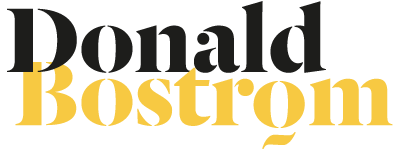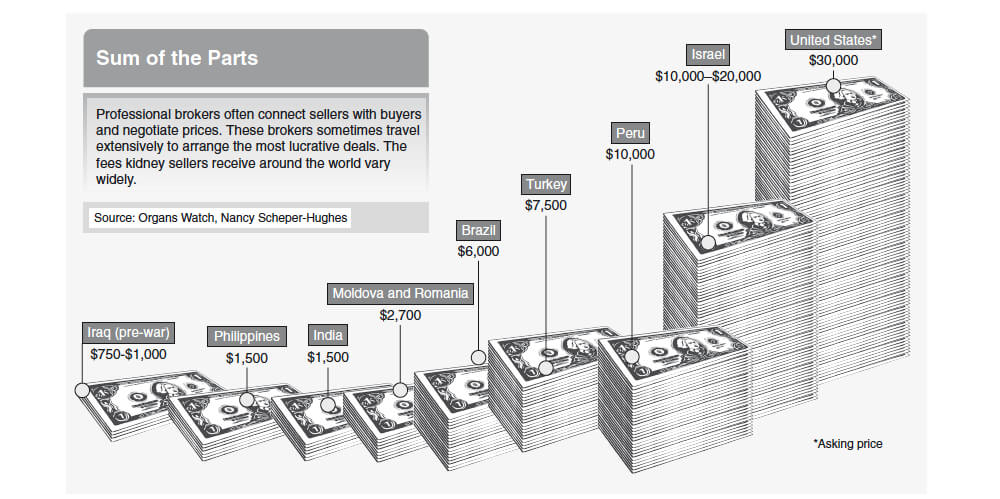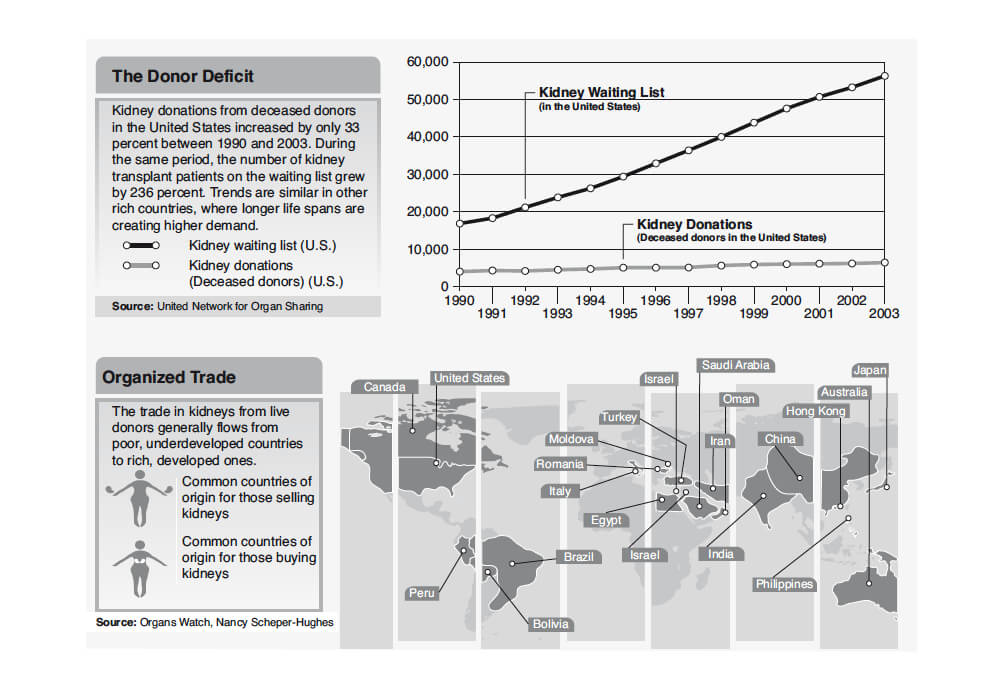Organ trafficking
Organ trafficking
Organs without borders
Donald Boström's speech at Doha conference for Qatar Foundation for Combating Human Trafficking (QFCHT)
By Donald Boström and Nancy Scheper-Hughes
The Bio Medical Abuses, where people are seen as a source of biological products, (organ, tissue and body parts) is one of the century’s most controversial issues. The lawless trade of bodies from living and dead bodies shows no tendencies to diminish, rather the opposite. Today it is a part of the global illegal economy and is ongoing in more than fifty countries all over the world.
The global economy provides the ideal conditions for an exceptional movement of people, including desperately mortally sick bodies traveling in one direction, and “healthy”, but desperately poor owner of organs in another. Creating new networks of international body trade, driven as if it were like any other businesses on the market. Supply and demand.
Large demand combined with low access makes the industry one of the most profitable in the world. For a kidney weighing 160 grams, is worth as much as a kilo of gold. In order to meet the global demand of organs, two illegal methods are used: Organ Harvesting, where organs, tissues and parts of the body are stolen by deadly injured or newly killed people. The second method and the most economically profitable is organ trafficking, where brokers, intermediaries, and mafia groups in an unholy alliance with unscrupulous doctors and authorities convey the contact between sellers and buyers. In the belief that a poor life is going to be better, living people persuade to sell their kidney for up to a thousand dollars. In many cases they never get payed. The sellers are always the poor, and the buyers are from the rich part of the world.
Transplant traffic depends primarily on four populations:
- patients willing to travel great distances and face considerable risk and insecurity.
- desperate and mobile kidney sellers.
- outlaw surgeons willing to break the law and violate professional codes of ethics.
- organs brokers with connections to organized crime, police and even military protection.
The traffic also requires an institutionalized indifference on the part of government and justice, a policy of don’t ask, don’t tell.
Criminal networks organize kidney patients from rich countries connected with the Turkish junk dealers, Palestinian refugees, runaway soldiers from Iraq and Afghanistan, and they justify what they are doing that it will ‘save a life’.
Illegal transplant transactions are complex and require expert teamwork among technicians in blood and tissue laboratories, dual surgical teams working in tandem, and post-operative nurses. Travel, passports, and visas must be arranged.
Ethic definition
Patients with advanced progress of kidney disease see this as the only option. Is it ethically justifiable to undergo a commercial kidney transplant? why could not the recipient, did legal philosophers in 1998 ask in an essay in the prestigious medical journal Lancet? We talking about the marginalized in the society, the invisible. If people are not visible, their organs are also "invisible" and can be removed as if they never existed.
According to other debaters, it is "paternalistic" and "dogmatic" to try to prevent poor donors from selling their body parts, as this could give them a new life.
- How many of these brokered kidneys are removed from sellers who are coercively trafficked?
- Where does trafficking end and consensual behaviour, distasteful, but legal, begin?
- Or, is the exploitation of vulnerable populations enough to apply the label of trafficking?
According to UN, human trafficking for organs is similar to other forms of trafficking – drugs, arms, sex, and labour trafficking.
UN’s ‘Palermo Protocol’, which defines human trafficking as the “exploit action of human beings whether for sexual exploitation, forced labour, slavery, or for the removal of human organs.” It further states that human trafficking involves “the recruitment of people through criminal means or by threat or use of force, coercion, abduction, fraud, deception, or by the abuse of power or the abuse of vulnerability”.
By that definition alone, almost any recruitment of kidney sellers constitutes trafficking.
Kidney sellers are predictably poor and vulnerable, the displaced (refugees, guest workers, new immigrants) and the disgraced, ex-prisoners, mental patients).
Several of the kidney sellers which the professor of anthropology, Professor Nancy Scheper-Hughes, interviewed did not really understand what they had agreed to do. “Do you know what a kidney is for?” Professor Nancy Scheper-Hughes asked a 19 year old boy who had just agreed to sell one. “No”, he replied, “except that ‘Uncle Ray told me that I have two of them and that I will be healthier if I get rid of the extra one.”
Indeed, most victims of human trafficking are not coerced by physical threats or force, but are coerced by need and offered a proposition that, in their vulnerable condition, they cannot refuse. Organs trafficking also differs from other forms of human trafficking.
Most forms of human trafficking fall under the category rotten trade, trade for ‘bad’ items (cocaine, guns, sexual commerce),
However, trafficking kidneys is a traffic for the good – life saving through organ transfer.
How does the kidney market work? Moldavia
Brokers offered unemployed youth, an opportunity of working abroad – in jobs ranging from construction, painting jobs in restaurants and in dry cleaning factories. On arrival, the young men were kept in safe houses, their passports confiscated.
A few days later the local brokers would break the news that it wasn’t painting or pressing pants that was needed from the illegal ‘guest workers’, but their kidneys.
One of them, Vladimir explained his decision to go through with the surgery in Istanbul at the hands of a Turkish doctor. ”Yes, so I did it, But if I hadn’t given up my kidney to that dog of a surgeon my body would be floating somewhere in the Bosporus Straight.”
Organ trafficking also takes place in economically developed countries where historically marginalized people are in a constant state of vulnerability. An example from 2003 demonstrates how this occurred within Israel’s borders; a leading figure in international organs trafficking used a lightweight criminal gang composed of recent immigrants from the former Soviet block.
United Lifeline – a Front for Organs Trafficking
In both Israel and the United States religious organizations, charitable trusts work to support organ transplants. United Lifeline (Kav L’Chaim) in Israel, is a charitable religious organization, that has helped Israelis raise money. United Lifeline had offices in various locations and in addition to human trafficking operations, was laundering the money raised for its ‘charities’.
Trafficking in war and political conflicts – Militarization and organs trafficking
Israeli transplant tourists said that they felt safe on plane flights to Turkey because there was often a military person accompanying the group and helping the patients get quickly through customs and immigration and letting them know that the operations were in a sense officially authorized by the Israeli state.
These structures include the marginalization of the vast majority of the world’s population. Organ harvesting, the selling, buying and stealing of organs from nearly dead or injured people, is one of the dirtier aspects of organ trafficking.
“Invisible” people have “invisible” organs: marginality and organ harvesting
What are the structural factors in the society that allows organ thefts? Who is marginalized? What people are “invisible”? If people are invisible, their organs are somehow also “invisible – not necessary to them. They can be removed as if they never existed.
We are talking about a moral collapse in societies in protracted war and conflicts, Like the apartheid system in South Africa, the political repression (dirty war) in Argentina, and in colonizer or occupying contexts like that in Israel. The Arab spring increased the supply of human trafficking victims of organ trafficking. And there is a number of reports stating that the terror group, the Islamic State, has organized organ trafficking as part of their financing activities. These cases have in common that they have all harvested organs from their enemy.
Studies have been conducted on people in poor countries who had sold a kidney in the hope that it will improve their lives. Afterwards, many suffered from poor physical and mental health. An overwhelming majority had ended the money within just a few months. Their lives did not get any better. Their lives were often worse. Most people did not understand that selling 160 grams of tissue would marginalize them further.
In Moldova, organ donors to be considered "one-kidney" and "half-men", and that they will never find a partner. They were reduced to a kind of prostitute in the social structure.
Article published in The Brown Journal of World Affairs.
By Donald Boström and Nancy Scheper-Hughes.



